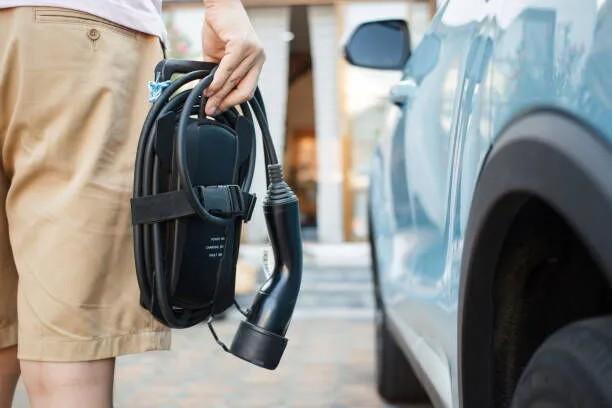Notifications

8 minutes, 23 seconds
-4 Views 0 Comments 0 Likes 0 Reviews

Topper Company, a professional China EV charger manufacturer, delivers reliable electric vehicle charging stations and comprehensive charging solutions.
Electric vehicles (EVs) are rapidly transforming the way we travel, but for many new owners, one practical question remains: How do I keep my car charged when I’m away from home or far from public charging stations? The answer increasingly lies in portable EV chargers.
A portable EV charger is a highly convenient device that allows drivers to recharge their vehicle’s battery wherever there’s a compatible power outlet—whether at home, on road trips, at work, or even remote vacation spots. With the global EV market expanding and more drivers transitioning away from combustion engines, portable chargers have become a vital tool for worry-free electric driving.
This guide explores how portable EV chargers work, their benefits, how to select the right one, and why they are poised to play a crucial role in the EV ecosystem for years to come.
At its core, a portable EV charger is a compact, easy-to-carry charging unit that lets you recharge your vehicle without relying solely on fixed home or public stations. Unlike wall-mounted chargers, portable units are designed for maximum mobility and convenience.
A typical portable EV charger consists of:
Control Box: The “brains” that regulate and monitor power flow from the outlet to your vehicle.
Power Cable: Connects to a standard electrical outlet—either a 120V outlet for Level 1 charging or a 240V outlet for faster Level 2 charging.
Connector Plug: Plugs into your EV’s charging port. In North America, this is usually the universal SAE J1772 connector; Tesla owners use an adapter for compatibility.
Compact enough to fit in your trunk or garage, portable chargers ensure you’re always ready to recharge whenever necessary.
Portable chargers operate much like traditional home chargers: they draw electricity from an outlet, convert it to the correct voltage and current for your EV, and transfer it safely to your car’s battery.
The process includes:
Connection to Power Source: Plug into a compatible outlet—120V for Level 1 or 240V for faster Level 2 charging.
Power Regulation: The control box manages voltage and current to ensure safe, steady charging, often allowing adjustable amperage.
Vehicle Connection: The plug locks securely into the EV’s charging port, creating a weather-resistant link.
Charging & Monitoring: Indicator lights, displays, or smartphone apps provide real-time charging status and battery updates.
The main advantage: freedom from relying solely on fixed stations or searching for public chargers during trips.
True Charging Flexibility: Charge wherever you find a compatible outlet—ideal for road trips, camping, or visiting friends without dedicated chargers.
No Dependence on Public Infrastructure: Provides peace of mind when traveling to rural or underserved areas lacking public stations.
Cost-Effective: Typically less expensive to buy and install than permanent Level 2 chargers; easily shared among vehicles or lent to others.
Easy to Use: Plug-and-play design with no permanent installation required.
Compact and Lightweight: Designed for portability, many come with protective cases for convenient storage.
Emergency Backup: Useful if you run low on charge far from a public station, helping you avoid stressful situations.
| Level | Power Source | Charging Speed | Best For | Typical Use |
|---|---|---|---|---|
| Level 1 | 120V household outlet | Slow—adds 3–5 miles/hour | Overnight or backup charging | Included with most EVs |
| Level 2 | 240V outlet (dryer/RV plug) | Moderate—adds 12–30 miles/hour | Faster home charging, travel | Home wall chargers, some portable units |
| Level 3 | DC fast charging station | Fast—80% charge in 20–60 mins | Long-distance road trips | Commercial fast charging stations |
Portable chargers support Level 1 and Level 2 charging but currently do not support Level 3 DC fast charging due to hardware and infrastructure limitations.
Know Your Outlets: A 240V outlet is preferable for faster charging; 120V will work but charges slower.
Check Vehicle Limits: Ensure your charger’s amperage matches your EV’s maximum input.
Adjust Amperage Settings: If available, select an amperage suitable for your outlet to avoid tripping breakers.
Use Proper Extension Cords: Only heavy-duty, outdoor-rated cords should be used if necessary.
Monitor Charging: Use built-in displays or apps to track progress.
Store Properly: Keep the charger clean, dry, and safely stored to prolong lifespan.
Amperage & Output Power: Higher amperage enables faster charging but requires compatible vehicle and circuits (typically 16A–40A).
Cable Length: Longer cables increase flexibility but add weight and bulk.
Plug Compatibility: Confirm plugs match available outlets; some chargers offer multiple adapters.
Portability: Seek compact, lightweight designs with carrying cases if you travel often.
Weather Resistance: Ensure chargers are rated for outdoor use if needed.
Safety Certifications: Choose chargers compliant with local standards and built-in protections (overcurrent, overheating, etc.).
While they don’t replace fixed home or public stations, portable chargers fill critical gaps:
Apartment/Condo Residents: Enables charging where permanent installation isn’t possible.
Business Fleets: Keeps vehicles topped off between routes.
Disaster Preparedness: Paired with backup power, supports mobility during outages.
Travelers and Adventurers: Offers charging flexibility at cabins, campgrounds, or RV parks with 240V outlets.
As battery and charging technologies advance, portable chargers will become more powerful, faster, and smarter—featuring app controls, automated amperage adjustments, and real-time monitoring. Their role will grow, especially in areas where fixed infrastructure is still developing.
A portable EV charger is more than an accessory—it’s an essential tool for flexibility, convenience, and peace of mind. As EV adoption expands, portable chargers remain a smart investment for urban commuters, road trip enthusiasts, and outdoor adventurers alike.
By putting charging power literally in your hands, portable EV chargers ensure you’re never stranded looking for your next charge.Know more about Google SEO Directory
China EV Chargers EV Charger Manufacturer EV Charging Solutions

